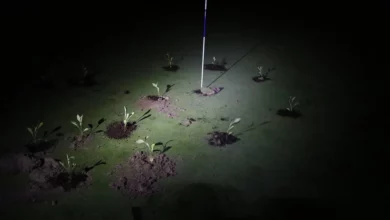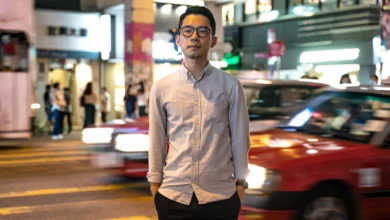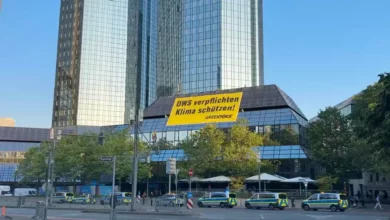2009 witnessed a wave of demonstrations, egged on by young activists and tech-savvy students, who seem to have shaken the "opposition forces" out of their sleep, thus filling a void left behind by the ineffectiveness of more organized groups like the Kifaya movement and the perpetually infighting Ghad and Wafd parties.
The political agenda is unclear, or perhaps just varied. It is spread among several issues, including rallying against government oppression, religious bigotry, regional wars, and against average Egyptian’s general apathy towards politics.
Many of the young people engaging in political activism, or in other humanitarian and civic efforts, are doing so online, using blogs, Facebook, and the increasingly-popular Twitter, to further their causes.
This flare-up of political activity coincided with the moment Egyptians were starting to gain access to the internet in large numbers. Home computers and internet cafes became more popular, and the cost of going online from home or the office dropped. According to the latest statistics, about one in nine Egyptians has internet access, and around nine percent of those are members of Facebook, which currently ranks as the third most popular website after Google and Yahoo and has an average of 350 million active users, according to the website’s press room statistics.
The technological leap came after a largely quiescent decade. Egyptian politics began to heat up in 2004 with the emergence of the Kifaya movement, a network of activists from across the political spectrum determined to fight the ruling regime and embrace new technologies as instruments of struggle.
Focusing on civic freedoms and the possibility of a transfer of power from President Hosni Mubarak to his son Gamal, Kifaya staged a series of colorful rallies that attracted Arab and international media attention. With Kifaya, a youth group was born named "youth for change," comprised mainly university students. These students staged a series of demonstrations, including pro-democracy gatherings of hundreds of students on university campuses in April and September 2005. In November 2006, they organized "shadow elections" to create a parallel, unauthorized Free Student Union. Such groups, which have taken their "resistance" to the blogosphere, were clearly frustrated by their inability to contest student union elections, as administrators screened out leftists and Islamists from lists of possible candidates.
Ramy Raoof, a human rights activist and a blogger, says he wouldn’t use the term "electronic activist," to describe the members of this new online trend. He does, however, praise social media as a tool for journalists and bloggers who are already active offline. According to Raoof, the new technology did not create activism but created "a breathing space" for these protesters and young pundits to override security restrictions.
"In the last three years, the blocking of free speech in television and print media, in addition to punishment and persecution of journalists, and censorship in independent and partisan newspapers, has led people to look for alternative ways of expressing themselves," Raoof says. "That’s about the time when Twitter and Facebook starting becoming popular. When offline sources became almost obsolete because of oppression, people started going online."
The Chinese and Iranian experiences also provided lessons for activists everywhere on how to use these tools to fight government hegemony, Raoof says.
"Twitter has saved people there by providing information to international media. These tools also broke the barrier of time. You can update in real time in addition to posting videos and pictures," he says.
Philip Rizk, who lived in Gaza in 2006 and 2007, used online tools to give his take on the Israeli-Palestinian conflict and give an alternative version of the story. Rizk, who is writing a book about the colonization of the Gaza strip and who has produced a documentary from there titled This Palestinian Life, kept a blog that he updated regularly while living in Gaza. Rizk was almost like a traditional war-zone reporter, but he used his eye-witness accounts to push a pro-Palestinian agenda.
"I saw there was much more purpose to it," Rizk says. "I was living there on the ground. I had personal experiences to share, which is something that’s different from what you get in the news."
"I’ve lived through incursions, I’ve lived through Israeli attacks, through everything with people in Gaza. I couldn’t do anything different than I’m doing now. Being involved in any way that I can possibly in order to get the story out and communicate the reality," Rizk says.
He is not the only one. The blogging scene inside Egypt has seen similar endeavors, mainly lead by bloggers and citizen journalists like Wael Abbas , ‘Ala Abd al-Fattah , and ‘Amr Gharbiyya . These citizen journalists are at the cutting edge of internet activism, offering platforms for political debate and posting firsthand accounts of Kifaya and other demonstrations replete with video and photographs.
Indeed, the blogs have attracted many young people to political activism mainly because, as Abbas says, "We don’t use a boring or unrealistic discourse like most politicians. We use their language, and we are more or less their age. We cover political events very fast with photos and videos, we don’t use the ‘government nothing happened’ way, nor do we use Al-Jazeera’s very loud way."
A glimpse around a downtown café shows how student activism is growing by the day. Young Egytians sip cappuccinos and discuss politics. The students are outspoken and opinionated on issues from education to Islamism.
A heated debate has arisen in newspapers, blogs, and indeed at these cafés about when and how young people in Egypt get involved in politics and why they are interested.
"This generation is totally sporadic, which is good and bad. Good in the sense that they do a lot of good moves and political initiatives like their pro-Gaza activities, and their call for a general strike on April 6 in 2008. And bad in the sense that they are not organized and they lack experience," says writer Khaled el-Balshi and former editor-in-chief of the defunct leftist newspaper el-Badeel.
The April 6 Youth Movement is a group of 70,000 young and educated Egyptians, most of whom were never involved in politics before. The movement developed more or less spontaneously on Facebook in 2008 as part of an effort to stage a nationwide general strike.
April 6 Youth Movement is centered around a few issues: free speech, economic stagnation, and government nepotism. The movement’s members share their ideas for improving Egypt. But they do more than just chat. They have tried to organize street protests to free jailed journalists; they participated in demonstrations about Gaza, some of which were coordinated on Facebook; at least eight members of the group have been detained by police.
But the outcome of April 6’s efforts is unpredictable. In 2009 they called for another general strike on April 6 and it turned out to be a failure. It’s not clear whether they will attempt the same in 2010.
"They haven’t seen an example to follow," suggests Abbas, who thinks this generation of activists is hard to "define."
"This generation, there are so many different education systems and so many TV stations, so there are cultures within the culture. Some are very liberal, some are very religious, and so on," Abbas says.
Some members of the April 6 movement share Abbas’s take on the situation. Member and student Asmaa, 24, says that for many young activists, it is a learning process. "Sometimes we succeed, and sometimes we fail, and yes it is a random movement, but everyday we become more aware of who we are and what we want, and change takes time."
Asmaa comes from a middle class Egyptian family, studied business administration and, in her own words, is neither "well read, nor politicized."
She became interested in politics for the first time just a year and a half ago, when she received a Facebook invitation to join the April 6 strike. "I loved the idea that everyone comes together and is unified in a peaceful strike. I started going into Facebook discussions and very interesting chats, then I learned that as an Egyptian citizen I have rights and that I can change things peacefully," she says, adding that along with other activists she is currently conducting visits to many neighborhoods to assess problems and campaign to solve them.
Asmaa’s generation has been lucky enough to see many big street demonstrations, something non-existent in Egypt a decade earlier or at least not covered by local or regional media.
It began with the US invasion of Baghdad in March 2003, when demonstrators took to the streets and almost a million Egyptians gathered in Tahrir Square. The September 2005 presidential elections led to many demonstrations against Mubarak, lampooning him for winning a fifth consecutive six-year term. There were also several rowdy demonstrations in solidarity with Gaza during the Israeli war on the Strip in December 2008.
What is new, according to el-Balshi, is introducing the local agenda to the list of these demonstrations. "Ten years ago, we used to campaign for big issues. I was at the university at the time of the Gulf war, and then the Oslo agreement, we used to demonstrate for this," el-Balshi says. "But this generation of activists and bloggers, they speak about internal problems like freedom of expression and torture in prisons. They are also fed up. They were all born during Mubarak’s regime. Some even got married and have children and still they haven’t seen another president."
The fact that tens of thousands of "fed up" young Egyptians meet online to debate and plan events is remarkable, given the context of political repression in which it is occurring, el-Balshi says. Organized groups opposed to Mubarak’s National Democratic Party have long lived under constant surveillance by the government and their leaders are regularly jailed. As a result, most Egyptian opposition groups remain small and are often plagued by infighting.
Mohammed Gaber, 23, who blogs under the handle "Egyptian leftist," is one of those recently attracted to politics. "In 2007, I was a student and I wasn’t interested in politics, but then I started reading some interesting blogs on the internet. And I asked myself what am I doing? These people have jobs and they still find the time to blog and I became jealous of these bloggers and decided to have my own blog. We are a pathetic generation. We have no big project to gather around and we have a future of unemployment laying ahead of us," says Gaber, a graphic designer.
But how far can a disappointed generation of young people go? Somaya, an art students, sips her coffee and reflects on the last strike.
"It was April 6, and you know what happened? The university invited pop singer Mohammed Hamaki, and all the students went to his concert instead of striking," she says, declaring that she is going to search for another venue to express her dissatisfaction with politics, "maybe acting or dancing or writing."
Does online activism necessarily reflect real change on the street? Not really, says Raoof, "because people have this inherent fear of going out to protest on the street. People know that on the street they can get targeted and beaten up. It’s easier to say things online."
Rizk agrees. "In Egypt, we have a special case because there’s such a spirit of fear among people to get involved in any sort of criticism of the government," he says. "As well, the Egyptian propaganda does a very good job of keeping the majority of the people in the dark."




